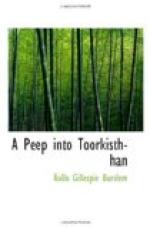As we were preparing to start early on the morning of the 31st, we met a traveller pursuing his solitary way to Keune, who, after expressing his wonder at encountering a party of Feringhis in such a place, inquired our proposed route. We informed him that our intention was to proceed over the Surruk Kulla pass and make our way to Badjghar, but he cautioned us not to attempt any such thing; for though the road was better than the more direct one, called the Espion Pass, it was infested by a robber tribe from whose hands he had himself only escaped, not having any thing to lose.
This unwelcome intelligence induced Sturt to change his plan, and we agreed that having done our utmost to fulfil the wishes of government in ascertaining the nature of the passes in the vicinity of Badjghar, it was our duty to consult the safety of ourselves and followers, and get them as soon as possible within reach of protection. We had no food of any kind left, but after all we did not anticipate much serious evil from a forced fast of forty-eight hours; so, after rewarding our wanderer for his very seasonable warning, we struck off to cross the Espion Pass. The event proved how imminent had been our danger, for after reaching Badjghar we were made aware that a large body of horsemen had assembled in the Surruk Kullah valley for the purpose of attacking us—that they had come up the road to meet us, and had actually reached the point where we turned off about two hours after us.
We travelled the whole of the 31st August across a succession of broken passes; so complicated were the valleys and so broken were the range of hills, that we were unable to tell when we reached the back-bone of the ridge, and we struggled on in doubt and difficulty till we were again overtaken by the shades of night.
Our cattle were quite exhausted; our followers grumbling, dispirited, and frightened, the prospect of a second bivouac by no means improving their discipline and insubordination.
While I was endeavouring to pacify them by the only argument I had at my disposal, founded on the principle of “levius fit patientia quidquid corrigere est nefas,” one of our servants brought us the joyful news that from an eminence adjacent he had discovered an abatta, or clump of blanket tents, surrounded by cultivated land, about a mile off. Where tents were, food would probably be obtainable; and as we were not in a condition to be very particular as to the character of the inhabitants, we immediately despatched an embassy with money to purchase whatever edible substances they could procure. Our anxieties were now relieved by the return of our mission, driving before them a couple of very thin sheep, and carrying a small supply of corn for the cattle. With this reasonable supply we made a tolerable meal, and succeeded in putting the discontented into a better frame of mind.




